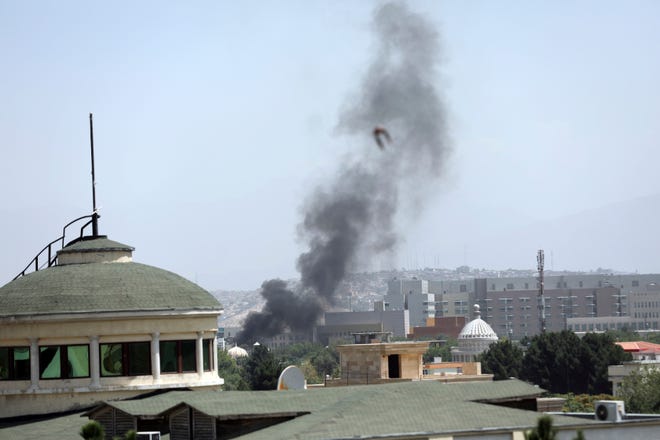
- Secretary of State Antony Blinken did not directly say if the U.S. embassy was being closed.
- Taliban fighters entered Kabul on Sunday and sought the unconditional surrender of the government.
- The Pentagon spent $80 billion in to train and equip Afghan forces over the past 20 years.
- The U.S. Embassy in Kabul instructed Americans to "shelter in place" as airport came under fire.
WASHINGTON – The U.S. Embassy in Kabul warned on Sunday that the security situation in Afghanistan was deteriorating and instructed American citizens to "shelter in place" amid reports of gunfire at the airport in Afghanistan's capital.
The embassy's security alert came as U.S. troops were evacuating all diplomatic staff from the embassy to the airport and as the Taliban entered Kabul, seemingly poised to take over the government.
"The security situation in Kabul is changing quickly," the U.S. Embassy notice said. "There are reports of the airport taking fire; therefore we are instructing U.S. citizens to shelter in place."
It was not immediately clear how the alert would affect the planned evacuation of diplomats and Afghans who worked with American troops over the course of the 20-year war. Earlier on Sunday, Secretary of State Antony Blinken said all embassy staff were being taken to the airport for their safety.
What we know about Afghanistan:How did the Taliban retake Afghanistan so fast? What's happening now?
"Right now, the plan that we're putting into effect is to move personnel from the embassy compound in the capital to a location at the airport to ensure that they can operate safely and securely," Blinken said on ABC's "This Week."
Asked if the embassy was being shuttered, Blinken did not directly answer the question. "The compound itself, our folks are leaving there and moving to the airport," he said, adding that a "core diplomatic presence" would remain in the country.
Spokespeople at the embassy in Kabul and at the State Department in Washington did not respond to messages Sunday.
The security alert said Americans who wanted assistance leaving Afghanistan would have to register through a repatriation form and should not try to contact the embassy.
Hamid Karzai International Airport, on the north side of the city, is just miles from the U.S. Embassy. Helicopters ferry passengers to the airport in a matter of minutes.
Blinken flatly rejected comparisons to America's ignominious withdraw from Vietnam in 1975, which ended with iconic images of U.S. helicopters evacuating Americans from the roof of the embassy in Saigon.
"This is manifestly not Saigon," Blinken argued, characterizing the drawdown of embassy and other personnel as "very deliberate."
More:Many fear Taliban will again end Afghan human rights, support terrorism

But the Biden administration was clearly caught off guard by the Taliban's rapid advances in recent days as the militant Islamic group took over a slew of provincial capitals across the country and encircled Kabul. President Joe Biden set an Aug. 31 deadline to withdrawal all U.S. forces from Afghanistan and bring an end to the 20-year conflict.
President Ashraf Ghani flew out of the country, according to Abdullah Abdullah, head of the Afghan National Reconciliation Council, who posted a video online.
"We've now created a situation where, as we get to the 20th anniversary of 9/11, we are surrendering Afghanistan to the terrorist organization that housed al-Qaida," Rep. Liz Cheney, R-Wyo., said on ABC.
Cheney said that Biden's decision to withdrawal all U.S. forces is catastrophic but that he is not solely to blame. She noted that former President Donald Trump and former Secretary of State Mike Pompeo set the withdrawal in motion after signing a deal with the Taliban, under which the group agreed to renounce its ties to al-Qaida and the U.S. agreed to drawdown all forces.
Cheney recalled that Trump had even invited Taliban leaders to the U.S. for secret meetings at Camp David, although he later canceled that session.
"They walked down this path of legitimizing the Taliban, of perpetuating this fantasy, telling the American people that the Taliban were a partner for peace," Cheney said. "President Trump told us that the Taliban was going to fight terror. Secretary Pompeo told us that the Taliban was going to renounce al-Qaida. None of that has happened."

Cheney and others have argued the U.S. should have kept a small contingent of several thousand American troops in Afghanistan indefinitely to keep the Taliban and al-Qaida at bay. Others have said that would have reignited deadly combat operations pitting U.S. forces against the militant Islamic group.
On Saturday, Biden announced an increased deployment of U.S. troops to Afghanistan to ensure "an orderly and safe" drawdown and evacuate U.S. personnel as well as Afghans who helped American forces during the 20-year war.
Three battalions, about 3,000 troops, are being sent to Kabul. Some have already arrived and are bolstering about 1,000 U.S. forces already on the ground. On Saturday morning, Biden approved a request from Defense Secretary Lloyd Austin to tap a battalion of a reserve force from the 82nd Airborne Brigade Combat Team to help with the evacuation, the official said. In all, there will be 5,000 U.S. troops in Kabul in coming days.
Taliban fighters entered Kabul on Sunday and sought the unconditional surrender of the central government, The Associated Press reported, as Afghans and foreigners alike raced for the exit. Helicopters buzzed overhead as the U.S. evacuated personnel from the embassy, according to the AP.
In its stunning military rout, the Taliban faced little to no resistance from the Afghan security forces, even though the Biden administration had repeatedly touted their ability to fend off the insurgent group. The Pentagon spent $80 billion in to train and equip Afghan forces over the past 20 years.
Speaking to CNN, Blinken acknowledged the “hollowness” of the Afghan security forces, even as he defended the president's decision to withdrawal all U.S. forces.
“From the perspective of our strategic competitors around the world, there’s nothing they would like more than see us in Afghanistan for another five, 10, 20 years,” he said. “It’s simply not in the national interest.”
Contributing: The Associated Press
Source link









